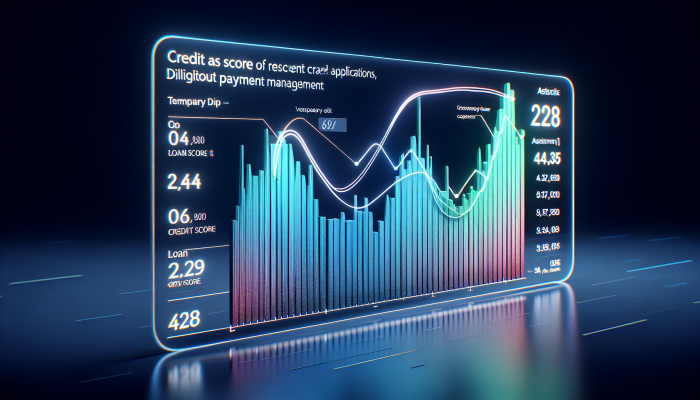Understand the Profound Effects of Debt Consolidation on Your Credit Score for Better Financial Management
Engaging in debt consolidation can serve as a profound financial strategy that enhances your overall monetary stability. It is crucial to grasp how debt consolidation affects your credit score to make informed decisions that lead to a secure financial future. By examining the intricacies of your credit score and understanding the implications of consolidation, you can confidently maneuver through your financial landscape, ensuring that each step taken is calculated and beneficial.
Assessing the Short-Term Effects of Debt Consolidation on Your Credit Score

As you begin your debt consolidation journey, it is common to experience a temporary drop in your credit score. This initial decline usually results from hard inquiries that occur when you apply for new credit accounts, such as a personal loan or a balance transfer credit card. Lenders conduct these inquiries to assess your creditworthiness, and each inquiry can cause a minor dip in your score. It is important to remember that while this decrease may seem alarming, it is generally a temporary hurdle rather than a lasting setback.
The first decrease in your credit score can be particularly disconcerting, especially if you are already navigating financial difficulties. However, you can effectively mitigate this initial decline by responsibly managing your consolidated debt and ensuring timely payments. As you consistently meet your obligations on the new loan or credit card, the impact of the hard inquiry will lessen, leading to a gradual recovery of your score. This stage requires patience and steadfast determination to achieve your financial goals.
Enhancing Long-Term Credit Utilization Benefits through Debt Consolidation
One of the most notable long-term benefits of debt consolidation is its ability to lower your credit utilization ratio. This essential metric evaluates the relationship between your total credit card balances and your total available credit, making it a key factor in determining your credit score. A reduced credit utilization ratio signals to lenders that you handle credit responsibly, which can significantly improve your credit profile.
By consolidating your debt, especially through the repayment of high-interest credit cards, you can drastically decrease your outstanding balances. This reduction leads to a healthier credit utilization ratio, ideally keeping it below 30%. Maintaining a low utilization rate not only strengthens your credit score but also positions you as a lower-risk borrower in the eyes of financial institutions.
However, it is crucial to maintain this low utilization level post-consolidation. Accumulating new debt on your credit cards after consolidation can undermine the positive effects on your credit score. Thus, a disciplined approach to managing your credit after consolidation is essential for achieving enduring success.
Understanding the Critical Role of Payment History in Debt Consolidation
Your payment history stands as the most significant factor affecting your credit score, accounting for approximately 35% of your FICO score. Consequently, utilizing debt consolidation to establish a manageable payment plan can greatly enhance your credit profile. By consolidating your debts into a single monthly payment, you simplify your obligations, making it easier to stay organized and financially responsible.
Consistently making on-time payments following consolidation will contribute positively to your credit score. Each punctual payment adds a favorable entry to your payment history, which helps counteract any initial negative impact from hard inquiries. The longer you maintain a strong payment history, the more significant its influence becomes in the overall calculation of your credit score.
While this journey may demand discipline and perseverance, the ultimate payoff is a healthier credit score and an improved financial situation. Therefore, it is beneficial to view debt consolidation as a strategic tool rather than a mere short-term fix, as it can lead to remarkable long-term advantages.
Investigating Various Debt Consolidation Methods and Their Effects on Credit Scores

Developing a thorough understanding of the various debt consolidation methods is crucial, as each approach entails specific implications for your credit score. By exploring these options, you can make well-informed decisions that align with your financial goals and personal circumstances.
Utilizing Personal Loans for Strategic Debt Consolidation
Personal loans are a prevalent option for debt consolidation, enabling you to merge multiple high-interest debts into a single loan with a fixed interest rate. This approach can produce mixed effects on your credit score. When you apply for a personal loan, it results in a hard inquiry, which may momentarily decrease your score. However, once you begin making consistent payments, the positive impact on your credit score can be substantial.
Moreover, personal loans generally offer lower interest rates compared to credit cards, allowing you to save on interest payments while effectively managing your debt. As you reduce your consolidated debt, your credit utilization ratio improves, further enhancing your credit score.
Nonetheless, it is essential to steer clear of accumulating new debt while repaying your loan. This practice ensures that you maximize the benefits of debt consolidation while maintaining a healthy credit score.
Harnessing Balance Transfer Credit Cards for Effective Debt Management
Balance transfer credit cards present an appealing option for consolidating debt. They allow you to transfer high-interest credit card balances to a new card that offers a lower interest rate, often featuring an introductory 0% APR. This strategy can significantly decrease your interest payments, but it comes with specific credit score considerations.
Applying for a balance transfer card will lead to a hard inquiry, which can temporarily impact your credit score. Nevertheless, if you manage to pay off your transferred balance within the promotional period, you can enjoy significant savings. Additionally, this strategy can lower your credit utilization ratio, positively influencing your score, provided you keep low balances on your remaining credit cards.
However, if you fail to pay off the balance before the promotional period expires, the interest rate may rise sharply, resulting in higher payments that could strain your financial situation. Furthermore, maxing out your new balance transfer card could negatively affect your credit utilization ratio, leading to adverse consequences for your score.
Exploring Home Equity Loans for Debt Consolidation Solutions

Home equity loans offer another pathway for debt consolidation, using the equity built in your home as collateral to secure a loan. This option can provide lower interest rates, which is advantageous for managing high-interest debts, but it also comes with unique risks and implications for your credit score.
While a home equity loan can help reduce your credit utilization ratio and enhance your score, the risk of losing your home in the event of default is significant. Similar to other consolidation methods, applying for a home equity loan will generate a hard inquiry, temporarily lowering your credit score.
It is crucial to conduct a thorough assessment of your overall financial situation before pursuing this option. If you can confidently manage the payments and refrain from accumulating additional debt, a home equity loan can serve as a valuable resource for consolidating debt while simultaneously improving your credit score.
Proven Strategies to Mitigate Negative Effects on Your Credit Score During Debt Consolidation
Implementing the following strategies will ensure that your debt consolidation experience enhances rather than hinders your credit score. These practices will assist you in navigating the complexities of consolidation while safeguarding your financial health.
Choosing the Optimal Debt Consolidation Method That Fits Your Financial Needs
Selecting the most suitable debt consolidation method is essential for limiting adverse effects on your credit score. Take the time to thoroughly evaluate various methods, weighing their advantages and disadvantages in relation to your specific financial situation.
For instance, a personal loan may be an excellent option if you possess a steady income and a favorable credit profile due to its typically lower interest rates. Conversely, a balance transfer credit card with a limited ceiling might be more advantageous if your credit is less than ideal.
Conduct in-depth research on different lenders, scrutinize the fine print, and ensure that you fully comprehend the terms and conditions associated with each option. This diligence will empower you to select a method that aligns with your financial objectives while minimizing any adverse impact on your credit score.
Maintaining a Low Credit Utilization Ratio Post-Consolidation
Once you have completed your debt consolidation, it is vital to maintain a low credit utilization ratio to protect your credit score. A highly effective strategy is to avoid incurring new debt on your credit cards while you are in the process of paying off your consolidated loan. This practice helps keep your credit utilization low and positively impacts your credit score.
Additionally, consider utilizing budgeting tools to monitor your spending habits and ensure that you are living within your means. By maintaining low credit card balances and making timely payments, you reinforce a positive credit history, which is greatly appreciated by lenders.
Another practical approach involves requesting credit limit increases on your existing credit cards. This can enhance your total available credit, thereby reducing your credit utilization ratio, provided that you avoid increasing your spending.
Establishing a Robust Payment History to Elevate Your Credit Score
A strong payment history is essential for improving your credit score after debt consolidation. During the debt consolidation process, commit to making consistent, on-time payments. This dedication will not only enhance your credit score but also foster a sense of financial discipline.
Consider setting up automatic payments for your consolidated loan or credit card to guarantee you never miss a due date. Regularly monitoring your accounts can provide further peace of mind, allowing you to address any potential issues before they escalate.
Remember, a positive payment history signals to lenders that you are a responsible borrower. Over time, this can lead to increased creditworthiness and the possibility of more favorable loan terms.
Analyzing Real-Life Case Studies: The Impact of Debt Consolidation on Credit Scores
To gain a comprehensive understanding of the effects of debt consolidation on credit scores, let us examine real-life scenarios and case studies. These examples will illustrate how individuals have navigated the complexities of consolidation and the resulting impacts on their credit scores.
Case Study: Overcoming High-Interest Credit Card Debt
Consider Jane, who found herself burdened with overwhelming high-interest credit card debt. With multiple cards maxed out and monthly payments spiraling out of control, Jane decided to pursue a personal loan for debt consolidation.
Initially, Jane’s credit score dipped due to the hard inquiry resulting from her loan application. However, as she diligently made timely payments on her new loan, her credit score began to recover. Within a year, her credit utilization ratio significantly decreased, leading to a noticeable improvement in her credit score.
Through disciplined financial management, Jane successfully transformed her financial situation, leveraging debt consolidation to regain control over her credit.
Case Study: Streamlining Student Loan Payments for Enhanced Management
A recent graduate, Mark, faced the daunting task of managing several student loans with varying interest rates. He opted for student loan consolidation to streamline his payments and potentially lower his interest costs.
Initially, Mark experienced a slight dip in his credit score due to the hard inquiry associated with his consolidation efforts. However, his credit score gradually improved as he made consistent payments on the consolidated loan. Mark maintained a healthy credit utilization ratio by avoiding additional debt, exemplifying the positive effects of consolidation on his credit profile.
This case highlights how strategic debt consolidation can produce favorable outcomes for credit scores, particularly for young borrowers.
Case Study: Efficiently Managing Multiple Small Debts
Sarah had accumulated several small debts from personal loans and credit cards. She chose a balance transfer credit card with an introductory 0% APR to consolidate these obligations.
Although her credit score temporarily declined due to the hard inquiry, Sarah successfully paid off her transferred balance before the promotional period ended. Consequently, her credit utilization ratio improved, and her credit score steadily increased.
Sarah’s experience underscores the importance of effectively managing consolidation methods and illustrates the significant potential for improved credit scores through disciplined financial habits.
Debunking Common Myths and Misconceptions About Debt Consolidation and Credit Scores
As with any financial topic, many misconceptions surround debt consolidation and its effects on credit scores. Let us clarify some of the most common myths to gain a more accurate understanding of this financial strategy.
Myth: Debt Consolidation Always Results in a Lower Credit Score
A prevalent belief is that debt consolidation inherently leads to decreased credit scores. While it is true that hard inquiries can temporarily affect your score, debt consolidation can ultimately foster long-term improvements. By focusing on responsible payment habits and reducing your credit utilization ratio, you can significantly enhance your credit profile.
Understanding this nuance is essential for making informed decisions about your debt management strategies.
Myth: All Debt Consolidation Methods Yield the Same Results
Another common misconception is that every debt consolidation method produces identical effects on your credit score. Different options—personal loans, balance transfers, and home equity loans—carry unique implications for your credit profile.
Each method has advantages and disadvantages; therefore, it is crucial to evaluate them based on your specific financial circumstances and goals. A tailored approach to debt consolidation can maximize its benefits for your credit score.
Myth: Debt Consolidation Eliminates Your Debt History
Some individuals mistakenly believe that debt consolidation erases their debt history, providing a fresh start. In reality, consolidating your debts does not eliminate your previous payment history or existing balances; it merely combines them into a more manageable form.
Your credit report will continue to reflect your past debts, and responsible management of the consolidated debt is essential for demonstrating your creditworthiness. Recognizing this fact can help you approach debt consolidation with realistic expectations.
Addressing Frequently Asked Questions About Debt Consolidation and Its Impact on Credit Scores
What Is the Typical Timeline for My Credit Score to Recover After Consolidation?
Your credit score can typically take several months to bounce back following debt consolidation. The recovery timeline varies depending on your payment habits and overall credit utilization.
Can Debt Consolidation Enhance My Chances of Obtaining Better Loan Rates?
Absolutely! Consolidating your debt can improve your credit score, making you a more appealing borrower. This enhancement may qualify you for better loan rates.
What Actions Should I Take If My Credit Score Drops After Consolidation?
If you notice a decrease in your credit score after consolidation, concentrate on making timely payments and maintaining low credit utilization. Over time, these actions can help rebuild your score.
Is Debt Consolidation Suitable for Everyone?
Debt consolidation may not be the best strategy for everyone. It is vital to assess your financial situation, including your debts, income, and spending habits, before determining if this approach is right for you.
Can I Consolidate Student Loans and Credit Card Debt at the Same Time?
While student loans and credit card debts can be consolidated, they generally require different methods. To maximize potential benefits, consider specific options tailored to each type of debt.
Will Debt Consolidation Impact My Ability to Obtain New Credit?
Initially, debt consolidation may affect your ability to secure new credit due to hard inquiries. However, with responsible management of consolidated debt, your creditworthiness can improve over time.
Are There Fees Associated with Debt Consolidation?
Certain debt consolidation methods may incur fees, such as balance transfer or loan origination fees. It is imperative to be aware of these costs before proceeding with consolidation.
How Can I Identify a Reliable Debt Consolidation Service?
Research and compare various debt consolidation services, focusing on reviews and ratings from reputable sources. Ensure that the service is transparent about fees and offers a realistic plan for managing your debts.
Is It Possible to Consolidate Debts Without a Strong Credit Score?
While a solid credit score simplifies consolidation, options exist for those with poor credit. Consider secured loans or collaborating with credit counselors to develop personalized strategies.
Can Debt Consolidation Serve as a Long-Term Financial Solution?
Debt consolidation can be a component of a long-term financial strategy but requires ongoing discipline and responsible financial management. Use it as a stepping stone towards a healthier financial future.
Stay Connected with Us on Facebook
This Article Was Originally Published At: https://www.debtconsolidationloans.co.uk
The Article Debt Consolidation’s Impact on Your Credit Score Was Found At https://limitsofstrategy.com


This post resonates with me, especially considering my own journey through debt consolidation. I remember the initial anxiety when I saw my credit score dip after applying for a consolidation loan. It felt counterintuitive to take a step toward financial health only to face that immediate setback. However, understanding that this was a temporary phase helped me stay focused on the long-term benefits.
Your experience really highlights the emotional rollercoaster that often comes with debt consolidation. It’s interesting how we expect immediate relief but can be taken aback by the initial dips in our credit scores. It’s a tough spot to be in—working toward a financial fresh start while feeling that sense of anxiety.
Your insights on the effects of debt consolidation really resonate with me. I went through a similar situation last year when I consolidated some high-interest credit card debt. Initially, I felt nervous about the anticipated drop in my credit score, but understanding that it was a temporary phase helped me stay focused on the bigger picture of financial health.